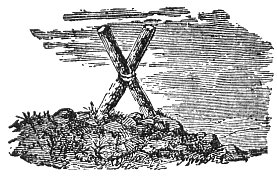p. 543
Baptism was one of their most important ceremonies; and the Basilideans celebrated the 10th of January, as the anniversary of the day on which Christ was baptized in Jordan.
They had the ceremony of laying on of hands, by way of purification; and that of the mystic banquet, emblem of that to which they believed the Heavenly Wisdom would one day admit them, in the fullness of things [Πλήρωμα].
Their ceremonies were much more like those of the Christians than those of Greece; but they mingled with them much that was borrowed from the Orient and Egypt: and taught the primitive truths, mixed with a multitude of fantastic errors and fictions.
The discipline of the secret was the concealment (occultatio) of certain tenets and ceremonies. So says Clemens of Alexandria.
To avoid persecution, the early Christians were compelled to use great precaution, and to hold meetings of the Faithful [of the Household of Faith] in private places, under concealment by darkness. They assembled in the night, and they guarded against the intrusion of false brethren and profane persons, spies who might cause their arrest. They conversed together figuratively, and by the use of symbols, lest cowans and eavesdroppers might overhear: and there existed among them a favored class, or Order, who were initiated into certain Mysteries which they were bound by solemn promise not to disclose, or even converse about, except with such as had received them under the same sanction. They were called Brethren, the Faithful, Stewards of the Mysteries, Superintendents, Devotees of the Secret, and ARCHITECTS.
In the Hierarchiæ, attributed to St. Dionysius the Areopagite, the first Bishop of Athens, the tradition of the sacrament is said to have been divided into three Degrees, or grades, purification, initiation, and accomplishment or perfection; and it mentions also, as part of the ceremony, the bringing to sight.
The Apostolic Constitutions, attributed to Clemens, Bishop of Rome, describe the early church, and say: “These regulations must on no account be communicated to all sorts of persons, because of the Mysteries contained in them.” They speak of the Deacon’s duty to keep the doors, that none uninitiated should enter at the oblation. Ostiarii, or doorkeepers, kept guard, and gave notice of the time of prayer and church-assemblies; and also by private
p. 544
signal, in times of persecution, gave notice to those within, to en-able them to avoid danger. The Mysteries were open to the Fideles or Faithful only; and no spectators were allowed at the communion.
Tertullian, who died about A. D. 216, says in his Apology: “None are admitted to the religious Mysteries without an oath of secrecy. We appeal to your Thracian and Eleusinian Mysteries; and we are especially bound to this caution, because if we prove faithless, we should not only provoke Heaven, but draw upon our heads the utmost rigor of human displeasure. And should strangers betray us? They know nothing but by report and hearsay. Far hence, ye Profane! is the prohibition from all holy Mysteries.”
Clemens, Bishop of Alexandria, born about A. D. 191, says, in his Stromata, that he cannot explain the Mysteries, because he should thereby, according to the old proverb, put a sword into the hands of a child. He frequently compares the Discipline of the Secret with the heathen Mysteries, as to their internal and recondite wisdom.
Whenever the early Christians happened to be in company with strangers, more properly termed the Profane, they never spoke of their sacraments, but indicated to one another what they meant by means of symbols and secret watchwords, disguisedly, and as by direct communication of mind with mind, and by enigmas.
Origen, born A. D. 134 or 135, answering Celsus, who had objected that the Christians had a concealed doctrine said: “Inasmuch as the essential and important doctrines and principles of Christianity are openly taught, it is foolish to object that there are other things that are recondite; for this is common to Christian discipline with that of those philosophers in whose teaching some things were exoteric and some esoteric: and it is enough to say that it was so with some of the disciples of Pythagoras.”

Moe is the founder of GnosticWarrior.com. He is a father, husband, author, martial arts black belt, and an expert in Gnosticism, the occult, and esotericism.



![How the same King Oswald, asking a bishop of the Scottish nation, had Aidan sent him, and granted him an episcopal see in the Isle of Lindisfarne [635A.D.] | Book 3 | Chapter 3 How the same King Oswald, asking a bishop of the Scottish nation, had Aidan sent him, and granted him an episcopal see in the Isle of Lindisfarne [635A.D.] | Book 3 | Chapter 3](https://www.gnosticwarrior.com/wp-content/plugins/contextual-related-posts/default.png)


